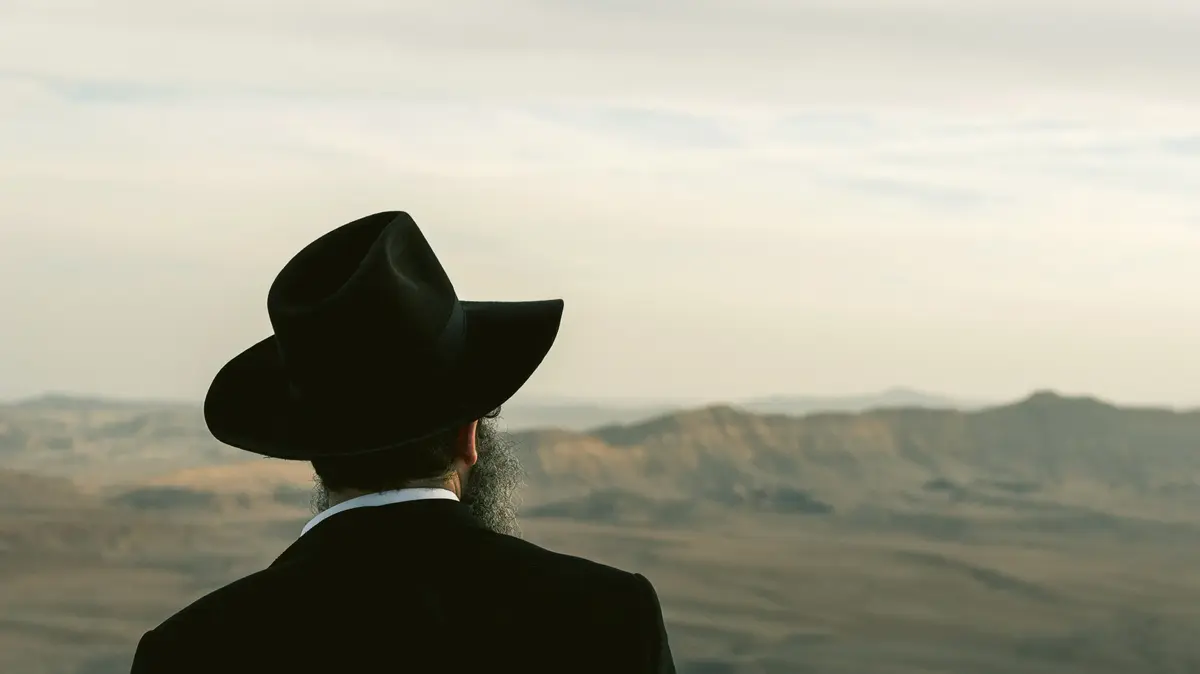Fasting on the 17th of Tammuz: Who must fast and who is exempt?
The rabbis of the Chabad Halacha Institute compiled the main laws relevant to each of us, just before the 17th of Tammuz fast, which will take place this year on Shabbat, and therefore was postponed for the first time.
Arie Zamir, submitted on behalf of Shuva Israel
14/07/2022
Thursday, 14 July 2022, 13:38 Updated: 13:42
Share on Facebook
Share on WhatsApp
Share on Twitter
Share on Email
Share on general
An ultra-Orthodox Jew looks on (Photo: ShutterStock)
The 17th of Tammuz fast will take place this year on Shabbat, so it has been postponed to Sunday.
Lent time
Lent begins at dawn.
Anyone who went to bed regularly on the night before Lent, and intended to get up and eat before dawn - is allowed to eat.
But if he did not plan to eat, and it happened that he woke up and wanted to eat, it is forbidden to eat and it is permissible to drink.
And first of all it is right to condition also for drinking only.
Those who are fasting Every man and woman from the age of observance must fast, as well as allies, and the bride and groom within the seven days of the feast - fasting.
Children under the age of Bar Mitzvah or Bat Mitzvah - do not fast.
A patient who has fallen asleep or who has weakened his whole body is exempt from fasting.
And fetuses are exempt from fasting.
And especially if they feel weak they should not aggravate themselves and fast.
Pregnant or breastfeeding full or partially exempt, women in other periods who have difficulty will turn to the rabbi.
Those who are exempt from fasting, will eat only foods that are necessary for the existence of the body and not kinds of sweets, in order for them to share in mourning with the public.
The policy of fasting
on the day of fasting does not wash the mouth.
And instead of sorrow such as the one who suffers from the smell of the mouth, it is possible to gargle with mouthwash that is not suitable for drinking (but not on Yom Kippur and Tisha B'Av).
Forget and eat or drink, stop eating as soon as he remembers and continue fasting and say "cloud" as usual, and do not have to complete fasting on another day, but redeem it in charity.
The law of "Ananu"
in the morning prayer Only the public messenger at the recitation of the Shatz says "Ananu" - between the blessing "Redeemer Israel" and "Rafano", and if he forgets says in the blessing "Hear our voice" before the words "Because you hear", and seals the blessing "This season To his people Israel in times of trouble and hears prayer. '
In the mincha prayer (the fasters) say 'Ananu' when hearing a prayer, and also the apostle accumulated in the prayer of a spell say when he hears a prayer.
But in the repetition of the Shatz, the Shatz says 'Ananu' between the blessing of 'Redeemer Israel' and 'Rafano'.
An individual who forgot to say 'Ananu' in his prayer - will say after 'Elki Natsur', before 'they will have the will', without a signature.
Will not remember until another has finished his prayer - will not return.
Slichot and "Our Father our King" say Slichot in the prayer after the fall of our noses - before 'Our Father our King'.
In saying the slichot in the order of desalination, 'Elkino and Elki of our ancestors skip.
.
We are guilty '.
After the selichot is over they say the long 'Our Father and King'.
If there is a groom or a word in the synagogue - do not say 'our father is our king'.
Then they say "and we will not know".
Half Kaddish.
Reading the Torah
Three readers are called "Vayhal Moshe", even if there are only three who are fasting.
Those who do not fast will not be called to ascend to the Torah.
And if he is called to ascend and is sorry to announce that he is not tormented by the desecration of God - he will ascend.
In the recitation of the verses "Again from the wrath of your nose", "God is merciful to God" and "Forgive us for our season" - the public first says aloud, and the husband calls after them.
The one who ascends to the Torah, will begin to say them with the public and will strive to finish them together with the Baal Kora.
Seder Tefilah Mincha
And he will speak incense, please by force, blessed, half Kaddish.
The publication of a Torah scroll and the recitation of "Vayhal Moshe" are performed by three people, and the third is the one who utters "Darshu Hashem". Ananu 'hears a prayer, and in the repetition of the Shatz the Shatz says' Ananu' between the blessing of the 'Savior of Israel' and 'Rafano'. And falling of noses, opening the ark and saying the long "Our Father, our King", "And we will not know", Kaddish "will be accepted", "We must praise" and
Kaddishim
.
The meals that were supposed to be eaten today;
Judaism
magazine
Tags
Judaism







